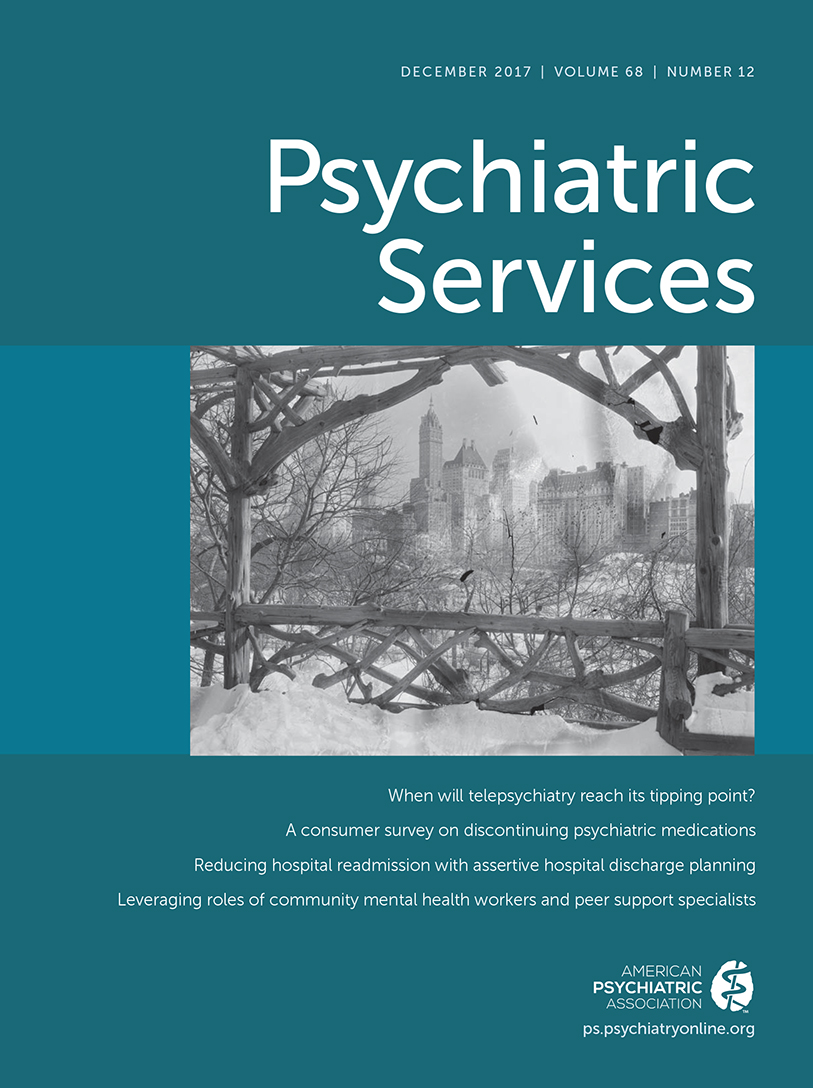Predictors of Staff Attitudes Toward Schizophrenia Treatments
TO THE EDITOR: Despite the existence of a range of evidence-based psychological interventions, the treatment of schizophrenia remains largely pharmacological (1). Lack of available nonpharmacological therapies for people with schizophrenia may be partly due to the attitudes of mental health professionals toward people with this disorder (2,3).
Whereas the attitudes of lay people toward schizophrenia have been extensively researched, mental health professionals’ views remain underresearched. Compared with the general public, some professionals seem to have less negative attitudes regarding dangerousness and unpredictability in schizophrenia and more optimistic views about usefulness of treatments and recovery (2,3). However, evidence of professionals’ negative attitudes also exists, especially regarding prognosis and the capacity of people with schizophrenia to participate in collaborative therapeutic relationships (4).
We conducted a survey to explore whether mental health professionals’ attitudes toward various treatments for people diagnosed as having schizophrenia were predicted by professional staff’s beliefs about people with this disorder. We hypothesized that professionals who more strongly recommend long-term medication and less strongly endorse psychosocial interventions for schizophrenia would be more convinced that people with this disorder are dangerous and unpredictable; these professionals also would be more pessimistic about recovery, more skeptical about the capacity of people with schizophrenia to have trusting service user–staff relationships, and less positive about the role of family as a resource for the patient.
The survey, approved by the Research Ethical Board of the Department of Psychology of Campania University, was carried out at the Mental Health Department of Caserta, Italy, from October 2015 to February 2016. Of the 302 professionals approached, 166 (55%) gave written informed consent and completed a questionnaire about people with schizophrenia and a range of treatments (5). [An online supplement provides details.] Ninety (54%) were female; the mean±SD age was 50.1±7.3 years; 134 (81%) were married or cohabiting; 32 (19%) were psychiatrists, 24 (14%) were psychosocial staff, and 110 (66%) were nursing or other health care staff.
Relationships between professionals’ views of people with schizophrenia and their families and beliefs about need for long-term medication and usefulness of psychosocial intervention were initially explored by Spearman’s r coefficients [see online supplement]. The simultaneous effects of views of people with schizophrenia and of their families on respondents’ beliefs about medication and psychosocial interventions were investigated by regression analyses.
Professionals who were more certain about the necessity of long-term medication more firmly believed that people with schizophrenia are dangerous (β=.24, p<.01) and incapable of a trusting relationship with staff (β=–.33, p<.001; F=17.59, df=4 and 135, p<.001; r2=.34). Professionals who attributed greater usefulness to psychosocial interventions had a lower perception of patients’ unpredictability (β=–.30, p<.001) and a more optimistic view about prognosis (β=.19, p<.05) and the role of families (β=.26, p<.001; F=11.8, df=5 and 131, p<.001; r2=.31).
These findings suggest that educating staff about stigma may help increase the provision of psychosocial interventions (1). Future studies should investigate whether improving service user–staff relationships—by helping professionals to identify a more positive focus and place greater value in their relationships with people with schizophrenia (4)—may help reduce prejudice and its effects on which treatments are offered to people with this disorder.
1 : Why do we not use psychosocial interventions in the treatment of schizophrenia? Australian and New Zealand Journal of Psychiatry 47:501–504, 2013Crossref, Medline, Google Scholar
2 : Stigma and mental health professionals: a review of the evidence on an intricate relationship. International Review of Psychiatry 19:137–155, 2007Crossref, Medline, Google Scholar
3 : Attitudes of mental health professionals about mental illness: a review of the recent literature. Journal of Community Psychology 38:49–62, 2010Crossref, Google Scholar
4 : Therapeutic working relationships with people with schizophrenia: literature review. Journal of Advanced Nursing 52:561–570, 2005Crossref, Medline, Google Scholar
5 : Effects of the diagnostic label “schizophrenia,” actively used or passively accepted, on general practitioners’ views of this disorder. International Journal of Social Psychiatry 63:224–234, 2017Crossref, Medline, Google Scholar



